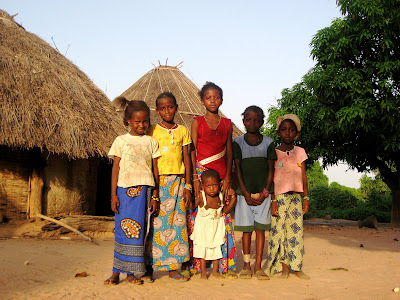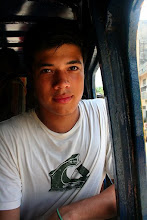
Lying diagonally with my feet off the edge of the bed and wishing I hadn’t eaten all those things I had the day before, the room span a bit and my head throbbed. I dreaded having to use the toilet again. I say this because the ‘toilet’ was a hole in the ground approximately the size of a ripe grapefruit, not to mention home to a seriously disturbing number of cockroaches and flies. From outside the hut, I heard the very deep voice of a man speaking English with a heavy British accent and some Franco-African trills at the ends of his words. Considering barely anyone spoke Wolof, let alone French in Salamata, this man who somehow spoke English intrigued me. I gathered enough will power to get myself upright and out of the low doorway of the hut. Taller than me, he stood next to his motorcycle, towering over the young boys of the compound playing soccer and the women and girls sifting through beans and roasted peanuts on the ground. He was speaking about the elections with our peace corps volunteer, seeming to be very much enjoying the opportunity to speak English. I joined in on the conversation and found out he was a representative of World Vision, an NGO that arranges for people in developed countries to sponsor children living in poverty. Not knowing how to use his digital camera, he asked me to take pictures of the children to be e-mailed to their British sponsor families. Having been with the children for nearly a week already and taken pictures of them, they cooperated with my hand motions and nods. With them properly positioned in the sunlight, I took their pictures. The man from World Vision was incredibly pleased with how simple it had been and how the pictures turned out while the kids were happy to find out what they looked like. I’m pretty sure most of the young children have never seen a mirror before. Soon thereafter, the man had gotten what he needed, put on his helmet, kicked his bike to a start and sped off, blowing up sand into the air in his wake.
The boys went back to playing soccer while the girls took their places on the ground again. The eldest took the one plastic chair being supported on its front two legs by pieces of wood as another girl sat in front of her so she could finish having her hair braided. I went back into the hut to lie down again and wait for our lunch of couscous with leaf sauce, a sauce of *drumroll* boiled leaves.
It was bizarre to find myself on the other end of all the canned food drives of junior school (the name for elementary school at UNIS), to find myself in one of those commercials asking you, yes, you to give a child a chance, to find myself with these people who before this had just been something I’d read about in newspapers or seen on television. While they lacked many things, they seemed genuinely happy. Having cup after cup of tea with friends and greeting everyone for at least a minute was enough. In America, we are very much defined by what we do. After your name, the inevitable next question is “What do you do?” (Or, if in college, “What’s your major?”) For them, it wasn’t just about doing. It seemed to be the opposite in Salamata where they found satisfaction in the company of others and producing for themselves simply what they needed to get by. A way of life definitely not for me, but for a week it was a very welcome break.
After a fourteen-hour car ride from Dakar through dust clouds and past fields of burning trash then tall baobabs then salt flats, we arrived in Kolda. At the peace corps house, having only gotten a few 20-minute periods of beyond bumpy sleep on the ride down after having been out dancing the night before just up until getting into the car to leave, I passed out early. The next morning, we tried to leave before the sun got too high, strapping our packs onto the backs of our bikes (which were actually rather nice, although very beat up, Trek bikes courtesy of the US Peace Corps) and riding out the 20 kilometers to Salamata in a group of three along paved roads. It felt great to be back on a bike and a little bit surreal riding alongside cotton fields and old Pulaar men. As we got further and further from Kolda, the calls from the children on the side of the road changed from “toubab toubab” to “toubako toubako”. You can guess what toubako means. At the village, we were greeted at our compound by our host family for the week and had missed greeting the chief as he was out working in the fields. Instead of taking lunch there, we hopped back on our bikes at the peak of the midday heat and made our way out further towards a weekly market. Not realizing what the heat could do, the additional fifteen kilometers out to the market was rough, but the countryside was beautiful and I managed to stretch what I had left in my water bottle to get me through it. Once we hit the market, the first matter of business was lunch. Between the three of us, we ate the last of a woman’s bean sandwiches for approximately seventy cents, my first experience with tapalapa, the hand-made baguette style bread of the region which was incredible. Making our way through the market and in desperate need of some relief from the dehydration and heat, our peace corps volunteer, Danny, insisted that we try the glaçes. Coming in bissap and baobab flavor, these miniature frozen juice bags looked a little bit dubious—but incredibly delicious. Throwing caution to the wind after having already biked nearly forty kilometers on the day in the African heat, I figured one small bag of frozen bissap juice (which is boiled in its preparation) couldn’t do too much damage. Alxamdoulilaah, it was incredible. Biting into the bottom left corner of the plastic bag with my teeth, it was everything I wanted at that exact moment. And then I wanted more. And this is where I think I got sick. A bag of donuts, 4 bissap bags and 1 baobab bag later, I was satisfied and we took a seat a little bit away from the market in the shade. Just as the sun began to set we rode back to Salamata, bringing up the total amount biked in our first day to about 50 kilometers or a little over 30 miles.
That night I shared a bed with the other American student, an upgrade from what I had imagined myself doing. It turns out that there wasn’t much for us to really doing the day since our peace corps volunteer, albeit an agriculture volunteer, was not in fact a farmer. His responsibility was not to go out in the fields and do the same work as the rest of the farmers but rather to change the way that they farmed to make it self-sustainable and efficient. This led to a lot of free time.
While it had gotten cool in Dakar, in the Kolda region, it was still frustrating hot and humid during the day. As a result, during the day, we stuck around the compound sorting through beans to be eaten and to be replanted, drinking tea with the men and picking up a few phrases in pulaar. One afternoon, I went out by myself into the fields to read the copy of “Prague” I’d taken from the peace corps house and to photograph. Armed with only my camera, “Prague” and my cell phone, I found a nice spot just on the edge of a millet field and looking out into a squash field. Et à ma grande surprise, c’était calme. Also to my surprise was that in the middle of a squash field and within view of the forest from where I could hear the calls of the monkeys and baboons, I had full service. In a village where they had neither running water nor electricity, they had not one but two cell phone towers. Development can be somewhat top-heavy, with this example being especially bizarre, since if someone had a cell phone it was mainly as a status symbol as they couldn’t afford to put credit on it. But I was glad to be able to stay in touch with my friends from the program when I felt so far away from everything.
Coming back to Dakar felt incredible. While I loved my time in Salamata, it was a serious relief to come back to civilization, a term I’ve learned is very much relative. Dinner that first night back was the first time since the first few weeks of ceebu jen at the beginning of the program that I’d enjoyed rice which had been considered a luxury in Salamata. I was particularly happy to have a bathroom again, even though there might not be a toilet seat and water all over the place, it was still better than using a hole in the ground. But mainly, I was happy to be back in a place that’s started to feel like home.
To see more pictures from my time in Salamata, please follow these links:
Rural Visits 1
Rural Visits 2

1 comment:
The range of experiences complete with the range of emotions makes this a life's memory for you. Nice photo albums to accompany the journals. I almost did not recognize you in the first photo that you appear, slightly in the shadows: older, thinner, & more worldly.
Post a Comment